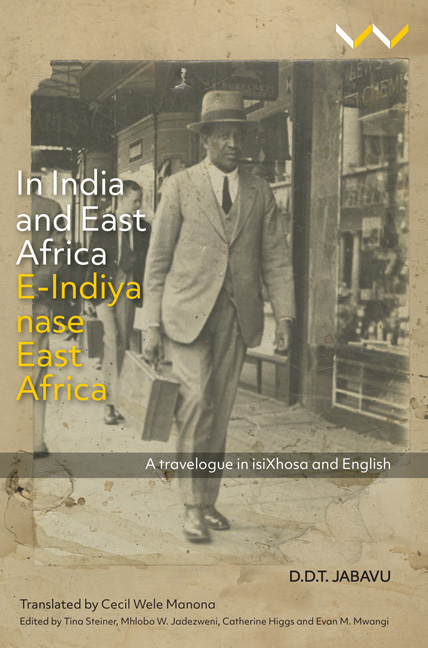Book contents
- Frontmatter
- Contents
- List of Illustrations
- Maps
- Acknowledgements
- Networks of Solidarity: D.D.T. Jabavu’s Voyage to India
- Revisiting D.D.T. Jabavu, 1885–1959
- Notes on the Original and the Translation
- In Praise of Cecil Wele Manona, 1937–2013
- E-Indiya nase East Africa
- In India and East Africa
- Afterword: Jabavu and African Translations for the Future
- References
- Editors’ Biographies
- Index
Chapter 4
Published online by Cambridge University Press: 27 March 2020
- Frontmatter
- Contents
- List of Illustrations
- Maps
- Acknowledgements
- Networks of Solidarity: D.D.T. Jabavu’s Voyage to India
- Revisiting D.D.T. Jabavu, 1885–1959
- Notes on the Original and the Translation
- In Praise of Cecil Wele Manona, 1937–2013
- E-Indiya nase East Africa
- In India and East Africa
- Afterword: Jabavu and African Translations for the Future
- References
- Editors’ Biographies
- Index
Summary
Agra
I started the journey to Agra at noon and I was very excited because there is one of the Seven Wonders of the World, the most beautiful building in the world. The house is built in the most exquisite way which I will explain later. The town has 310 000 inhabitants. We arrived in the evening in this city, which was established hundreds of years ago on the banks of the Jumna. It is the headquarters of emperors like the Rajahs, Nabobs and Nawabs.
I was met at the station by a friend who came by car, and who told me that he was going to take me straight to the meeting I was due to address immediately after my arrival because we would only find time for eating after the meeting. Because I did not have a meal before speaking, I was kindly given some snacks to drive away my hunger. People came and when I addressed them, I spoke about my country and this was reported in the papers. From there we travelled a long distance to a place where I was to be hosted and it was very cold. My host was a very rich man who was the manager of a glass company where they employ 400 people, with a capital of £70 000. It was very cold at night, just as it was in Delhi and the Himalayas. When my host noted that I was cold, he gave me a warm blanket made with thick cotton and I was comfortable. I spent three days here and I saw interesting things. This city is ten miles wide and it is very crowded, and if diseases like yellow fever, cholera and smallpox would erupt here many people would die. I say this because on the following day, 21 December 1949, we came across an area which had a very bad smell. This smell was caused by human excrement, which did not sink into sewerage. This reminded me of Nancefield in Johannesburg, where I saw night soil in the fields. Here the night soil runs between the houses of people, near shops and stables.
- Type
- Chapter
- Information
- In India and East Africa / E-Indiya Nase East AfricaA Travelogue in isiXhosa and English, pp. 242 - 255Publisher: Wits University PressPrint publication year: 2019



